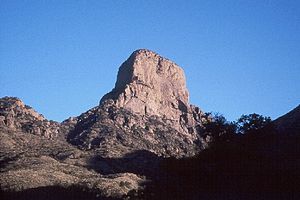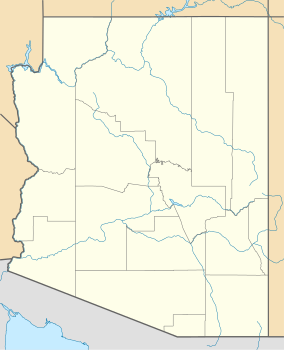Baboquivari Mountains
| Baboquivari Peak Wilderness | |
|---|---|
|
IUCN category Ib (wilderness area)
|
|

View of the east face of Baboquivari Peak
|
|
| Location | Pima County, Arizona, U.S. |
| Nearest city | Tucson, Arizona |
| Coordinates | 31°47′29″N 111°34′32″W / 31.7914724°N 111.5756642°WCoordinates: 31°47′29″N 111°34′32″W / 31.7914724°N 111.5756642°W |
| Area | 2,065 acres (836 ha) |
| Designated | 1990 |
| Governing body | Bureau of Land Management |
The Baboquivari Peak Wilderness is a 2,065-acre (8 km2) wilderness area in the U.S. state of Arizona. It is located in the Baboquivari Mountains 50 miles (80 km) southwest of Tucson, Arizona. It is administered by the Bureau of Land Management. The United States Congress designated the Baboquivari Peak Wilderness in 1990. It is the smallest such designated wilderness in the state of Arizona. Today, the 2,900,000-acre (12,000 km2) Tohono O'odham Nation (second largest in the United States) lies to the west. Baboquivari Peak's elevation is 7,730 feet (2,356 m). It is a popular site for many climbers, tourists and other visitors to Arizona and can be seen in the distance from the Kitt Peak National Observatory. The mountain was well known as a place to find flint for arrow points. It is translated as BA BO QUAY VI RA, the place for the mother lode of flint. (America, Land of the Rising Sun—Don Smithana).
Baboquivari Peak Wilderness is reported to have some of the best backcountry rock climbing in Arizona. It can be visited any time of the year; however, summer afternoons are usually too hot for hiking, and winter can bring an occasional snow shower to the peak's highest elevations. Sightings of jaguars have been recorded in the Baboquivaris during the last decades.
Baboquivari Peak is the most sacred place to the Tohono O'odham people. It is the center of the Tohono O’odham cosmology and the home of the creator, I'itoi. According to tribal legend, he resides in a cave below the base of the mountain.
This mountain is regarded by the O’odham nation as the navel of the world -— a place where the earth opened and the people emerged after the great flood. Baboquivari Peak is also sometimes referred to as I’Itoi Mountain. In the native O'odham language, it is referred to as Waw Kiwulik, meaning "narrow about the middle". The O'odham people believe that he watches over their people to this day.
...
Wikipedia


